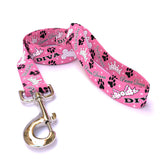Can a flea collar make a dog sick?

Fleas aren’t just a nuisance; they can be extremely bad for dogs. Fleas are blood-sucking parasites that can cause itchiness and rash, lead to anemia, and transmit tapeworms and even other diseases including the plague! It’s not an exaggeration to say that uncontrolled fleas can kill dogs. No wonder Americans spend billions of dollars every year on flea control in the form of preventative medication, topical medications, flea collars, and more. Keeping fleas at bay is important for your dog’s health.
But some dog owners want to know, are flea collars safe for dogs? Here’s what you should know.
Are Flea Collars Dangerous for Dogs?
They can be. While many dogs use flea collars without a problem, others have suffered health problems and some have died. Just last year, nearly 1,700 dog deaths were linked to Seresto flea collars after the EPA received thousands of reports, according to an investigation by USA Today.
But not all flea collars are the same. The three main types of flea collars are:
- High-frequency flea collars are chemical free and use soundwaves to repel (not kill) fleas
- Gas flea collars slowly release chemicals that kill fleas and their eggs nearby (i.e., on your dog’s neck)
- Absorption flea collars contain chemicals that are absorbed into the dog’s skin and kill fleas all over the body
The trade-off is that the most effective flea collars are also the most invasive, transmitting insecticides through the dog’s skin into their body. These insecticides are toxic by design, and it appears that they can adversely affect – even kill – dogs.
Flea Collars Are Also Dangerous for Children, Adults, and Other Pets
The EPA, which oversees and regulates the use of pesticides in the US, recognizes the potential risks of dog flea collars. In the past, it has cancelled registrations for some flea collars over concerns of risks to children’s health.
Makers of the flea collars advise dog owners to wash their hands thoroughly after fitting flea collars, to keep children away from the dog a day after fitting the collar and to prevent them from ever touching the collar, and to prevent other household pets from chewing on the collar because of the chemicals in them. These safety recommendations are a tacit admission that the chemicals in them are strong and unnecessary contact with them should be avoided.
Signs Your Dog is Allergic to Their Flea Collar
Is your dog having an adverse reaction to their flea collar? They may have a mild allergic reaction to it, or they may suffer worse. Here are signs to look out for if your dog wears a chemical flea collar:
- Irritated skin or a red rash where the collar sits on the skin
- Scratching or biting at the skin
- Loss of hair
- Hives
- Swollen, watery eyes
- Wheezing
- Lethargy
If you’re at all concerned that your dog’s flea collar is the cause of any sudden symptoms, remove the collar and make an appointment to speak with your veterinarian as soon as possible.
Safe Alternatives to Flea Collars
For a natural alternative to a chemical flea collar, consider dog collars infused with essential oils that are known for repelling fleas. You can find effective, all-natural essential oil flea collars at Hot Dog Collars. Infused with a combination of citronella, peppermint, geranium, and orange oils, they naturally repel fleas, ticks, and mosquitos without harmful chemicals.
This is one line of defense against fleas. Speak with your veterinarian about how you can protect your dog from fleas in a way that’s safe for your dog and your entire family.




